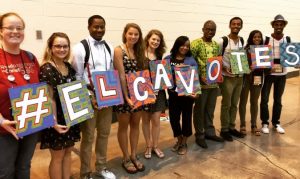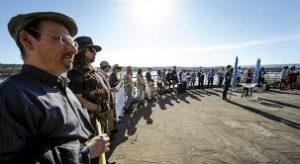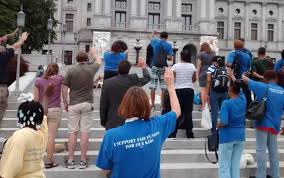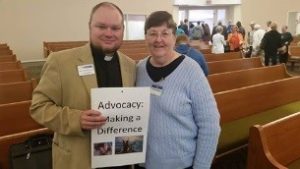Today’s post is by Rev. Amy E. Reumann, Director of Advocacy for the ELCA.
The Feast of Pentecost starts with a blast of fast rushing wind. The season itself can seem to go on forever. Entering my first parish call, a colleague warned me about “the dog days of Pentecost.” They theorized that the kind of lethargy that can accompany the heat of summer would affect our worship and ministry, too.
By mid-season, I understood. At the time I was preaching through several weeks of Gospel texts about Jesus as the bread of life. I was running out of things to say about what seemed to be a lectionary stuck on repeat. The organist left for an extended vacation without a substitute, leaving a cassette tape on which she had recorded the service music. Nobody sang along when I pushed the button. On Sundays the church was too hot, worshippers too few, energy was low and the season ahead seemed to stretch on forever.
The long distance run of the Sundays after Pentecost means we may gather to worship even when we don’t always feel like it. We persevere even when enthusiasm is running low and grace may not seem so amazing. It is ordinary time, far from the mountaintop experience of festival days, bringing us down to encounter God in the flow of daily life.
Engaging in advocacy can also require the same, long haul persistence. An advocacy colleague once shared the good news that her organization had helped pass the Dream Act in her state, offering educational opportunities to undocumented students. We were just starting to work on a similar bill and I wanted to know how they had done it, hoping for a magic solution. “It took ten years, you know,” she said. “You have to be committed to keep going, even when there is no end in sight.” Advocacy is slow work. There are more defeats and repetitious labor than wins. It means showing up and persevering during a long season, even when you feel stuck and like you are not going anywhere.
Advocacy’s scriptural foundations tend to rely on Jesus’ concern for the poor, the call of the prophets to justice or the actions of the early church. I think we are missing a vital connection by not looking more to the Festival of Pentecost, too. The Acts of the Apostles account begins with the Holy Spirit descending to loosen tongues of people from all corners of the earth. The presence of the Spirit unleashes testimony to the risen Christ. It reminds us, in our day, that there are many ways to let loose with our own witness to Jesus, including in unexpected ways and places.
 Advocacy, too, is an untying of tongues. It is spirit-inspired testimony to the God who justifies, who in turn sets us free to do justice. We advocate with and for our neighbors and the rest of Creation to preserve their dignity and protect their integrity. Faith-rooted advocacy is witness to our faith by proclaiming solidarity with the suffering of Christ’s body in the world and witnessing to God’s resurrection hope for a world transformed. This is evangelism and proclamation of the good news, just as surely as knocking on doors. Only this advocacy may take place at a town council meeting, a school board session or in the halls of the U.S. Capitol.
Advocacy, too, is an untying of tongues. It is spirit-inspired testimony to the God who justifies, who in turn sets us free to do justice. We advocate with and for our neighbors and the rest of Creation to preserve their dignity and protect their integrity. Faith-rooted advocacy is witness to our faith by proclaiming solidarity with the suffering of Christ’s body in the world and witnessing to God’s resurrection hope for a world transformed. This is evangelism and proclamation of the good news, just as surely as knocking on doors. Only this advocacy may take place at a town council meeting, a school board session or in the halls of the U.S. Capitol.
We don’t often connect advocacy with the worship during these Sundays after Pentecost. But this ordinary time is chock full of texts in which Jesus upends social customs and the social order to eat with outcasts, touch lepers, heal the sick and show compassion to those who are poor. Ordinary time reveals ordinary ways we can show solidarity with the people with whom Jesus spent most of his earthly ministry. And it brings fresh opportunities to heed God’s call for responding to hunger and injustice with witness to the God of justice. With the help and guidance of the Holy Spirit, of course.
How might you practice advocacy as persistence, presence and proclamation in service to the One who sends the Paraclete, the Advocate, to be present with us?

